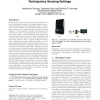Free Online Productivity Tools
i2Speak
i2Symbol
i2OCR
iTex2Img
iWeb2Print
iWeb2Shot
i2Type
iPdf2Split
iPdf2Merge
i2Bopomofo
i2Arabic
i2Style
i2Image
i2PDF
iLatex2Rtf
Sci2ools
174
click to vote
ATAL
2015
Springer
2015
Springer
Coordinating Measurements for Air Pollution Monitoring in Participatory Sensing Settings
Environmental monitoring is important, as it allows authorities to understand the impact of potentially harmful environmental phenomena, such as air pollution, noise or temperature, on public health. To achieve this effectively, participatory sensing is a promising paradigm for large-scale data collection. In this approach, ordinary citizens (non-expert contributors) collect environmental data using low-cost mobile devices. However, these participants are generally selfinterested agents having their own goals and making local decisions about where and when to take measurements, if any at all. This can lead to a highly inefficient outcome, where observations are either taken redundantly or do not provide sufficient information about key areas of interest. To address these challenges, a coordination system is necessary to guide and to coordinate participants. This paper proposes such a participatory sensing framework and presents a novel algorithm based on entropy and mutual informatio...
| Added | 16 Apr 2016 |
| Updated | 16 Apr 2016 |
| Type | Journal |
| Year | 2015 |
| Where | ATAL |
| Authors | Alexandros Zenonos, Sebastian Stein, Nicholas R. Jennings |
Comments (0)

